Dr Phoebe von Held in the Department of Psychology
Director and writer Dr Phoebe von Held was artist in residence in the Department of Psychology in 2014 where she created a performance exploring the ambiguities between paranoia, strategic thinking and self-consciousness through the use of theatre.
The Manual Oracle
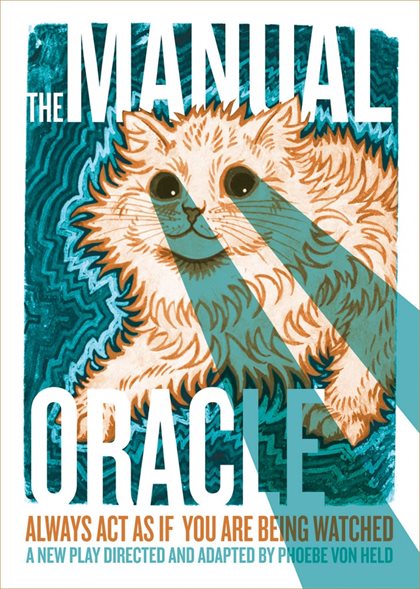
From November 2010 to October 2011, Phoebe was the Leverhulme Artist-in-Residence in the Department of Psychology in the Institute of Psychiatry, Psychology & Neuroscience (IoPPN) at King's where she worked with academics to create and develop a theatre project titled The Manual Oracle, which explored the ambiguities between paranoia, strategic thinking and self-consciousness.
During her residency, Phoebe investigated performance concepts, undertook dramaturgical research, commissioned and produced new writing on the basis of exchanges with researchers, therapists and service users affiliated with the IoPPN. Central to this dialogue was a shared interest in the topic of paranoia, which constitutes one of the key concepts of the production.
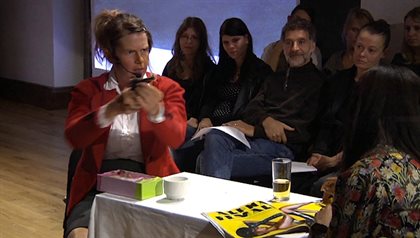 The performance piece was originally inspired by Baltasar Gracian’s 1647 Manual Oracle, or the Art of Prudence. In 300 statements (maxims), Gracian, a Jesuit monk, offers advice on how to survive the intrigues of the court, how to act in public, and how to retain the upper hand over one’s competitors. What is fascinating about this seventeenth-century ‘self-help-book’ is that Gracian’s instructions can be compared to the methods of the stage actor: the courtier should conceal his true self, play a role, and simulate false intentions. But Gracian also urges his readers to remain on the watch, because others are only waiting to harm you. Taking inspiration from Gracian's book, suspicion features strongly in Phoebe's The Manual Oracle, evoking a mental world where paranoia has become command: 'always act as if you are being watched!' (maxim 297)
The performance piece was originally inspired by Baltasar Gracian’s 1647 Manual Oracle, or the Art of Prudence. In 300 statements (maxims), Gracian, a Jesuit monk, offers advice on how to survive the intrigues of the court, how to act in public, and how to retain the upper hand over one’s competitors. What is fascinating about this seventeenth-century ‘self-help-book’ is that Gracian’s instructions can be compared to the methods of the stage actor: the courtier should conceal his true self, play a role, and simulate false intentions. But Gracian also urges his readers to remain on the watch, because others are only waiting to harm you. Taking inspiration from Gracian's book, suspicion features strongly in Phoebe's The Manual Oracle, evoking a mental world where paranoia has become command: 'always act as if you are being watched!' (maxim 297)
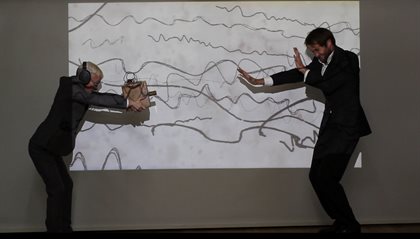 The Manual Oracle explored this intersection between theatricality, self-consciousness and paranoia, projecting it onto contemporary scenarios, such as immigration, racist xenophobia, surveillance, political rhetoric, simulation in corporate professions, and survivalist movements. It used the aphoristic structure of Gracian’s urgent instructions to create a kaleidoscope of brief scenarios, visual tableaux and sound pieces, dissecting states of mind in which strategic thinking has become almost indistinguishable from paranoia.
The Manual Oracle explored this intersection between theatricality, self-consciousness and paranoia, projecting it onto contemporary scenarios, such as immigration, racist xenophobia, surveillance, political rhetoric, simulation in corporate professions, and survivalist movements. It used the aphoristic structure of Gracian’s urgent instructions to create a kaleidoscope of brief scenarios, visual tableaux and sound pieces, dissecting states of mind in which strategic thinking has become almost indistinguishable from paranoia.
As well as the collaboration with the Department of Psychology, Phoebe also brought together writers, actors, artists and sound and stage designers to contribute to a work-in-progress performance of The Manual Oracle in September 2011. It was performed in the Anatomy Museum at King's following a five-day workshop in which the artist and collaborators worked with the new script, with performance, visual and sound concepts.
In 2012, the project was awarded funding from Arts Council England and from the Maudsley Charity for script completion, design conceptualisation and pre-production. This also included the development of creative writing workshops for NHS mental health service users, in particular people who had experienced paranoid thinking.
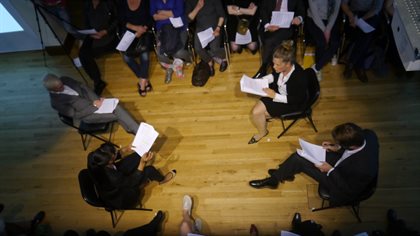
A rehearsed reading of the final script was performed again at the Anatomy Museum at King's in June 2013.
As a result of the work emerging from the residency, Phoebe was invited to become a Visiting Artist at the Institute of Psychiatry, Psychology & Neuroscience and a Visiting Research Fellow at the Department of English & Humanities (Theatre Studies), Birkbeck University of London to continue the work on The Manual Oracle. Both departments and universities supported the project through providing research facilities, rehearsal and office space, feedback opportunities and consultancy.
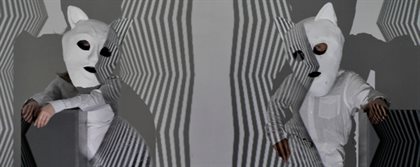 For example, in November 2012 and January 2013, and again in May 2014, Phoebe organised creative writing workshops, taught in two sessions, in collaboration with authors Natasha Soobramanien and Luke Williams, which were held at the IoPPN. The workshop was aimed at NHS service users and explored creative writing exercises, a home writing project, and feedback and group discussions about The Manual Oracle. The first session introduced the themes of project where participants undertook warm-up acting exercises and started preparing a scene to be explored more closely in the other session. In the second session participants enacted the chosen scene and shared it with the group which then lead onto conversations about their experience with it as actors and audiences.
For example, in November 2012 and January 2013, and again in May 2014, Phoebe organised creative writing workshops, taught in two sessions, in collaboration with authors Natasha Soobramanien and Luke Williams, which were held at the IoPPN. The workshop was aimed at NHS service users and explored creative writing exercises, a home writing project, and feedback and group discussions about The Manual Oracle. The first session introduced the themes of project where participants undertook warm-up acting exercises and started preparing a scene to be explored more closely in the other session. In the second session participants enacted the chosen scene and shared it with the group which then lead onto conversations about their experience with it as actors and audiences.
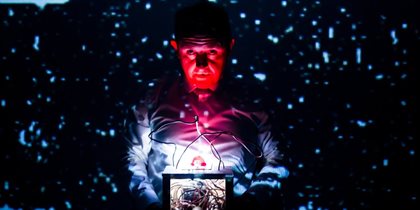 The Manual Oracle was then announced as part of the programme for the Anxiety Arts Festival in London in 2014. The show previewed at The Yard Theatre in Hackney on 27 and 28 May and then premiered on 29 May and ran until 14 June.
The Manual Oracle was then announced as part of the programme for the Anxiety Arts Festival in London in 2014. The show previewed at The Yard Theatre in Hackney on 27 and 28 May and then premiered on 29 May and ran until 14 June.
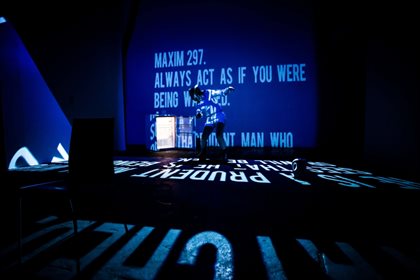
About the artist
Dr Phoebe von Held is a translator and director for theatre and film. Her previous work includes: Rameau’s Nephew and The Nun, both of which were adapted, co-translated, directed and designed for the Citizens Theatre, Glasgow in 1998 and 2003 respectively; D’Alembert’s Dialogues, an animation based on Diderot’s D’Alembert’s Dream, a dialogue between eighteenth-century materialist philosophy and today’s biomedical sciences (2005); and Chrysalis, an animation commissioned by ArtAkt for Crossing-Over: Exchanges in Art and Biotechnologies; shown at the Royal Institution (2008).
An ongoing interest in Phoebe’s work is the investigation of different manifestations of alienation characterising our postmodern condition. By using enigmatic historical texts as a starting point and projecting their resonances on to contemporary contexts, she seeks to probe into the conditions that determine today’s life politically, psychologically and sociologically. Phoebe’s practice includes writing, design and directing and her work is always collaborative, inviting other writers, co-translators, co-researchers from the arts and other professional or social groups to participate in devising new and innovative work.
Phoebe is also a researcher in theatre aesthetics and cultural studies, and in 2011 published the book Alienation and Theatricality: Diderot after Brecht, Oxford: Legenda. She is also a Visiting Research Fellow at the Department of English & Humanities (Theatre Studies), Birkbeck University of London.
For more information about Phoebe and her work please visit her website here.